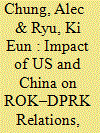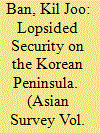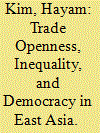|
|
|
Sort Order |
|
|
|
Items / Page
|
|
|
|
|
|
|
| Srl | Item |
| 1 |
ID:
185895


|
|
|
|
|
| Summary/Abstract |
This paper examines the anti-corruption movement initiated by Kim Jong Un, focusing on the increased rent-seeking competition between the elite and the middle class as market mechanisms have developed in North Korea. I examine two hypotheses regarding this program. First, it is focused on constraining the influence gained by the elite through power–money collusion to maintain regime stability. Second, it aims to support decentralizing economic reforms and the direction of production surplus into state finances, to secure state revenue. In substantiating these hypotheses, I argue that the movement is driven by the goal of capitalizing on the benefits of the market without compromising regime security, by regulating “competitive rent-seeking” between the elite and the middle class.
|
|
|
|
|
|
|
|
|
|
|
|
|
|
|
|
| 2 |
ID:
185893


|
|
|
|
|
| Summary/Abstract |
The relationship between the ROK and DPRK is bound to be affected by the two great powers—the US and China. Especially in recent decades, the power gap between the two great powers has continued to narrow. Given this, how is the geopolitical situation surrounding the Korean Peninsula shaping inter-Korean relations? This study uses event data and statistical analysis to explore the geopolitical factors that shaped inter-Korean relations from 1993 to 2019. We find that DPRK–ROK relations deteriorated as the power gap between the US and China narrowed. Also, inter-Korean relations were positive when DPRK–US relations were positive. In short, we conclude that during the shift in the US–China power distribution, maintaining positive DPRK–US relations while also managing inter-Korean relations peacefully is necessary for peace on the Korean Peninsula.
|
|
|
|
|
|
|
|
|
|
|
|
|
|
|
|
| 3 |
ID:
185894


|
|
|
|
|
| Summary/Abstract |
North Korea’s asymmetric provocations over the last decades can be classified into two periods: tactical provocations at sea in 1970–1990 and strategic (nuclear) provocations in 2000–2020. What is the logic underlying the North Korean imbroglio? And how does the former period differ from the latter? The first set of provocations was intended to shift the threat imbalance caused by a widening gap in conventional military capabilities into a balance of insecurity, where the weaker North Korean side faced South Korea and the combined ROK–US forces. The second set was intended to shift the balance of insecurity into an imbalance of terror while ensuring that only Pyongyang would be armed with nuclear weapons in the area. The “gray zone” discourse of the denuclearization of the Korean Peninsula (rather than North Korea) ended up bolstering North Korea’s nuclear program, while South Korea intensified only its conventional weapons program.
|
|
|
|
|
|
|
|
|
|
|
|
|
|
|
|
| 4 |
ID:
185892


|
|
|
|
|
| Summary/Abstract |
In 2017, Tokyo held landmark prefectural elections featuring a new regional party, Tokyoites First. Fueled by the popularity of Governor Yuriko Koike, Tokyoites First gained legislative control through an alliance with Komeito, relegating the Liberal Democratic Party (LDP) to opposition status. The alliance was surprising, especially since Komeito remained a national coalition partner with the LDP. Why would Komeito, a junior partner in a long-standing national alliance with the LDP, simultaneously ally with another party against the LDP subnationally? What explains such incongruence, or alliance juxtaposition, where a party has different partners across administrative tiers? We explain this dalliance in terms of institutional factors and party strategy. Tokyo’s distinctive voters and electoral system made for novel coalition opportunities. Strategically, Komeito’s fling signaled its autonomy to supporters and to LDP leaders, showing that its loyalty cannot be assumed.
|
|
|
|
|
|
|
|
|
|
|
|
|
|
|
|
| 5 |
ID:
185896


|
|
|
|
|
| Summary/Abstract |
Japanese energy policy has persistently promoted nuclear energy, even since the Fukushima disasters and despite failures in meeting its objectives. However, since Fukushima local actors (prefectures, towns, courts, and local activists) have grown more powerful with respect to policy and implementation. This paper analyzes the role of local civic actors in energy policy. A wide variety of literature is drawn on. The main finding is that, after successfully resisting nuclear restarts, local actors now understand that the future lies in renewables. Thus, the potential for local civic engagement to influence sustainable energy policy needs to be explored. The input and support of local communities are needed to strengthen the country’s energy security requirements and its pursuit of climate goals.
|
|
|
|
|
|
|
|
|
|
|
|
|
|
|
|
| 6 |
ID:
185897


|
|
|
|
|
| Summary/Abstract |
Has trade openness made East Asian countries more or less democratic? Although numerous studies have explored the economic effects of market integration in the region, few have systematically examined the political consequences of trade liberalization. This research extends previous work by empirically investigating not only direct but also indirect links between trade globalization and democracy in East Asia. I find that the direct negative effect of trade integration on democracy is mitigated by its indirect positive impact via inequality. Empirical evidence is provided by the three-stage least squares method and pooled time-series data from 1975 to 2015 for 13 East Asian states.
|
|
|
|
|
|
|
|
|
|
|
|
|
|
|
|
|
|
|
|
|